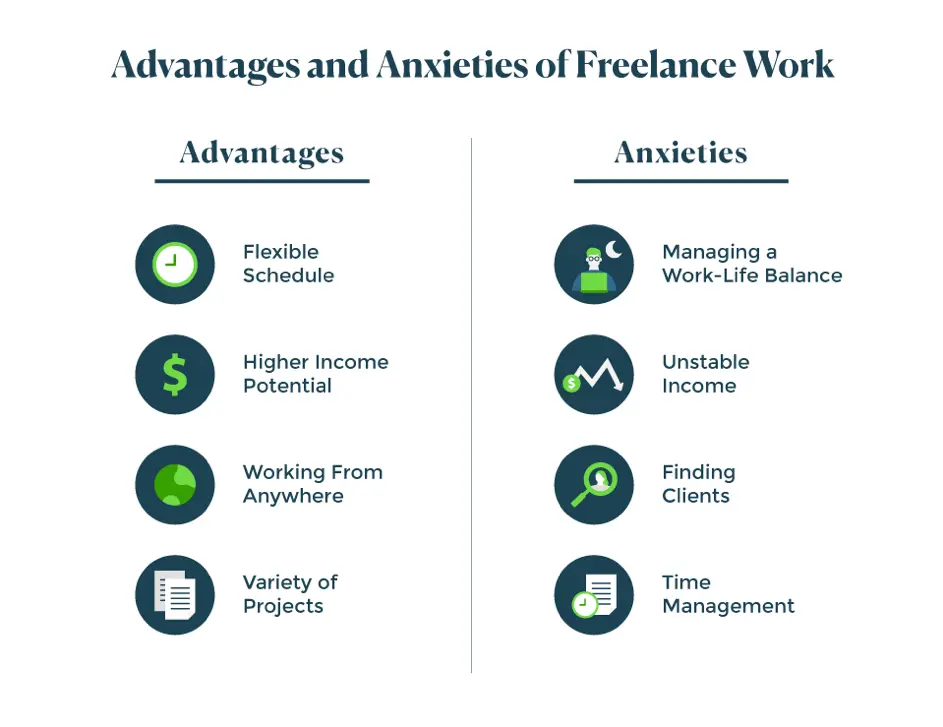Freelancing jobs are working independently for different clients on various projects. Freelancers are not tied to a single employer and can choose their jobs. They often work from home or any location they prefer. Freelancing offers flexibility and the freedom to set your schedule.
Freelancing is suitable for students because it allows them to work around their class schedules. They can take on projects during their free time and manage their workload. This flexibility helps students gain practical experience in their field of study and earn money without compromising their education.
Popular Freelancing Jobs for Students
1. Writing and Editing
Content writing involves creating articles, blog posts, and website copy. Students can write about topics they are knowledgeable about or passionate about. This job helps improve writing skills and can be done from anywhere with a computer and internet connection. Platforms like Medium, HubPages, and personal blogs are good starting points.
Editing includes proofreading and refining written content. Students can edit academic papers, resumes, and business documents. This work requires attention to detail and a good grasp of grammar. Freelance marketplaces like Upwork and Fiverr have many opportunities for writers and editors.
2. Graphic Design
Graphic design involves creating visual content like logos, brochures, and social media graphics. Students with a knack for creativity and experience in design software like Adobe Photoshop or Illustrator can find numerous opportunities. Freelancing websites and local businesses often seek designers for short-term projects.
This job helps students build a strong portfolio, which is crucial for a career in design. They can take online courses to enhance their skills and stay updated with the latest trends. Platforms like Behance and Dribbble are excellent for showcasing their work and attracting clients.
3. Web Development
Web development includes building and maintaining websites. Students with knowledge of HTML, CSS, and JavaScript can create websites for small businesses or personal projects. This job allows them to apply their coding skills and learn new technologies.
Developing web applications and customizing WordPress sites are also part of web development. Students can offer these services on freelancing platforms or through their own websites. Gaining experience in web development can lead to high-paying jobs in the tech industry.
4. Social Media Management
Social media management involves handling social media accounts for businesses and individuals. Students can create and schedule posts, engage with followers, and track performance metrics. This job is ideal for those who are social media savvy and enjoy creating content.
Managing social media accounts helps students understand marketing strategies and audience behavior. They can work with different types of businesses, from small local shops to online influencers. Tools like Hootsuite and Buffer can help streamline their work and increase efficiency.
5. Tutoring and Online Teaching
Tutoring involves helping students with their academic subjects. Students can offer tutoring services in areas they excel in, such as math, science, or languages. Online platforms like Chegg Tutors and Wyzant connect tutors with students in need of help.
Online teaching can include teaching English or other languages, as well as providing music or art lessons. This job requires good communication skills and patience. Websites like VIPKid and Italki offer opportunities for students to teach and earn money from home.
6. Data Entry and Virtual Assistance
Data entry involves entering information into spreadsheets or databases. This job requires attention to detail and basic computer skills. Students can find data entry jobs on freelancing websites and perform the work at their own pace.
Virtual assistance includes tasks like managing emails, scheduling appointments, and conducting research. This role is suitable for organized individuals who can handle multiple tasks. Virtual assistants often work with entrepreneurs, small business owners, and busy professionals to help them stay organized and productive.
How to Get Started as a Freelancer
Assessing Skills and Interests
Begin by identifying your skills and interests. Think about what you are good at and what you enjoy doing. This could be writing, graphic design, coding, tutoring, or any other skill. Knowing your strengths will help you choose the right freelance job that you will enjoy and excel in.
Once you have identified your skills, consider taking some online courses or tutorials to enhance your knowledge and stay updated with industry trends. This will not only improve your skills but also make you more competitive in the freelancing market.
Building a Portfolio
A portfolio showcases your work and demonstrates your abilities to potential clients. Start by creating samples of your work, even if you haven’t had any freelance clients yet. For example, write articles, design logos, or build sample websites to show what you can do.
Use online platforms like Behance, Dribbble, or a personal website to display your portfolio. Make sure to include detailed descriptions of each project and highlight your role in it. A well-organized and visually appealing portfolio can significantly increase your chances of landing freelance jobs.
Setting Up a Freelancing Profile
Create profiles on freelancing platforms such as Upwork, Fiverr, and Freelancer.com. These platforms connect freelancers with clients looking for various services. Fill out your profile completely, including a professional photo, a detailed description of your skills, and examples of your work.
Set competitive rates based on your skill level and market rates. Be realistic but also value your work appropriately. Start by taking smaller projects to build your reputation and gain reviews. As you gain experience and positive feedback, you can gradually increase your rates.
Finding Freelance Opportunities
Start by looking for freelance opportunities on various platforms and job boards. Websites like Upwork, Fiverr, Freelancer, and LinkedIn often have numerous freelance job postings. Apply to jobs that match your skills and interests.
Don’t hesitate to reach out to your network for potential freelance opportunities. Inform friends, family, and acquaintances about your freelance services. Networking can often lead to valuable connections and job offers.
Marketing Your Services
Promote your freelance services through social media and professional networks. Create profiles on LinkedIn, Instagram, and other relevant platforms to showcase your work and attract clients. Regularly update your profiles with new projects and achievements.
Creating a personal website or blog to highlight your services and expertise. Use SEO techniques to make your website more visible to potential clients. Additionally, you can write articles or create content related to your field to establish yourself as an expert.
Managing Freelance Work
Effective time management is crucial for freelancing. Use tools like calendars, to-do lists, and project management software to keep track of deadlines and tasks. Prioritize your work and set aside specific times for freelancing to balance it with other commitments.
Communication is key when working with clients. Be responsive to emails and messages, and keep clients updated on the progress of their projects. Deliver high-quality work on time to build a good reputation and secure repeat business.

Platforms and Resources for Finding Freelance Jobs
By using these platforms and resources, students can effectively find freelance jobs that match their skills and interests.
Upwork
Upwork is one of the largest freelancing platforms, offering a wide range of job categories including writing, design, web development, and more. Students can create a profile, showcase their skills, and bid on projects that match their expertise. Upwork’s robust search features and client reviews help freelancers find suitable jobs and build their reputations.
The platform charges a service fee based on your earnings with each client, but it provides valuable tools such as time tracking, secure payments, and dispute resolution. Beginners can start with smaller projects to gain experience and gradually take on more complex tasks as they build their portfolios.
Fiverr
Fiverr allows freelancers to offer “gigs” starting at $5. Students can list their services, such as writing, graphic design, video editing, and more. Fiverr is user-friendly and lets freelancers showcase their work samples and receive reviews from clients.
The platform is great for those who prefer to set their prices and create customized service packages. Fiverr also offers educational resources and tools to help freelancers improve their skills and market their services effectively.
Freelancer.com
Freelancer.com connects freelancers with clients looking for various services, from technical projects to creative tasks. The platform allows freelancers to bid on projects, participate in contests, and showcase their portfolios.
It provides tools for secure payments, project management, and collaboration. Freelancer.com also offers membership plans with additional features and benefits, helping freelancers enhance their profiles and increase their chances of winning projects.
LinkedIn is a professional networking site where students can connect with potential clients and showcase their skills. By creating a detailed profile, sharing work samples, and engaging with industry-related content, freelancers can attract job opportunities.
LinkedIn’s job search feature allows freelancers to find freelance positions and apply directly. Networking with professionals and joining LinkedIn groups related to their field can also lead to valuable connections and job offers.
Personal Networking
Personal connections can be a powerful way to find freelance jobs. Inform friends, family, and acquaintances about your freelance services and ask for referrals. Attend industry events, webinars, and workshops to meet potential clients and expand your network.
Social media platforms like Twitter, Facebook, and Instagram can also be used to promote your services and connect with potential clients. Regularly sharing your work and engaging with your audience can help you build a strong online presence and attract freelance opportunities.
Specialized Job Boards
Numerous specialized job boards are catering to specific freelance niches. For example, ProBlogger for writing jobs, 99designs for design work, and GitHub Jobs for development projects. These platforms focus on particular industries, making it easier to find relevant freelance opportunities.
Joining online communities and forums related to your field can also provide leads on freelance jobs. Websites like Reddit, Quora, and niche-specific forums often have sections where clients post freelance job listings.
Challenges and Solutions
Students can find the freelancing landscape successfully by addressing these challenges proactively and implementing effective solutions.
Dealing with Inconsistent Income
- Challenge: Freelancers often face fluctuations in their income, with periods of high earnings followed by slow times. This inconsistency can be stressful and make financial planning difficult.
- Solution: To manage inconsistent income, create a budget that accounts for your essential expenses and saves during high-earning months to cover lean periods. Diversify your client base to reduce dependency on a single source of income. Establish a financial cushion by setting aside emergency savings.
Balancing Freelancing with Studies
- Challenge: Juggling freelance work with academic responsibilities can be challenging. Students may struggle to manage their time effectively, leading to stress and potential burnout.
- Solution: Develop a realistic schedule that prioritizes both study time and work hours. Use productivity tools like planners and calendars to stay organized. Set clear boundaries between study and work periods, and communicate these boundaries to your clients to manage their expectations.
Finding Clients and Projects
- Challenge: New freelancers often find attracting clients and securing projects difficult, especially in a competitive market.
- Solution: Build a strong online portfolio showcasing your skills and past work. Use freelancing platforms, social media, and personal networks to market your services. Consider offering your services at a lower rate initially to build your reputation and gather testimonials. Over time, as you gain experience and positive reviews, you can increase your rates and attract more clients.
Maintaining Work-Life Balance
- Challenge: Freelancers may struggle to separate work from personal life, leading to overwork and a lack of downtime.
- Solution: Set specific working hours and stick to them. Create a dedicated workspace to separate work from personal activities physically. Take regular breaks and ensure you have time for hobbies, social activities, and relaxation. Maintaining a healthy work-life balance is essential for long-term productivity and well-being.
Handling Client Expectations
- Challenge: Managing client expectations can be tricky, especially when clients have unrealistic demands or unclear requirements.
- Solution: Communicate clearly and frequently with clients to ensure a mutual understanding of project goals and deadlines. Set realistic expectations from the beginning and document all agreements in writing. Don’t hesitate to ask questions and seek clarifications to avoid misunderstandings. Regular updates on project progress can help keep clients informed and satisfied.
Legal and Tax Considerations
- Challenge: Freelancers need to navigate legal and tax obligations, which can be complex and vary by location.
- Solution: Educate yourself on the legal requirements and tax regulations in your area. Consider consulting with a professional accountant or tax advisor to ensure you comply with all obligations. Keep detailed records of your income and expenses and set aside money for taxes. Use accounting software to simplify the process and stay organized.
Dealing with Isolation
- Challenge: Freelancing can be isolating, as freelancers often work alone without the social interaction of a traditional workplace.
- Solution: Find ways to stay connected with others. Join online communities and forums related to your field, attend networking events, and participate in coworking spaces. Schedule regular social activities with friends and family to combat isolation. Engaging with a community of freelancers can provide support, motivation, and opportunities for collaboration.

Conclusion
Freelancing offers students a flexible way to earn money and gain experience. It allows them to work around their class schedules and develop skills in their chosen field. By assessing their skills, building a strong portfolio, and using various freelancing platforms, students can find suitable projects and clients.
Despite challenges like inconsistent income and balancing work with studies, freelancing can be rewarding. Effective time management, good communication, and continuous learning are key to success.



